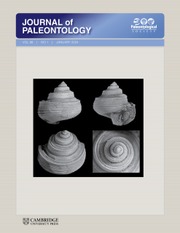Article contents
New kingenoid (Terebratellidina) brachiopods with larger body sizes from the Early Cretaceous of Zengővárkony (Mecsek Mountains, Hungary)
Published online by Cambridge University Press: 09 December 2019
Abstract
The small, Lower Cretaceous, iron ore deposit at Zengővárkony (Mecsek Mountains, southern Hungary, Europe) contains new brachiopod taxa of kingenoid relationships. Dictyothyropsis vogli, Zittelina hofmanni, and Smirnovina ferraria are described as new species from late Valanginian to earliest Hauterivian strata. The new taxa strengthen the presence of Early Cretaceous biogeographical connections with the Western Carpathians and the Pieniny Klippen Belt of southern Poland. The newly described taxa have significantly larger dimensions than their closest relatives from the type localities, which is in line with previous research on brachiopods from this environment. These brachiopods lived in a nutrient-rich, unique environment related to iron-ore deposition linked to former hydrothermal activity on the seafloor that might have contributed to the large size of these brachiopods. Larger than normal rhynchonellide and terebratulidine brachiopods have previously been recorded from this locality.
- Type
- Articles
- Information
- Copyright
- Copyright © 2019, The Paleontological Society
References
- 3
- Cited by


